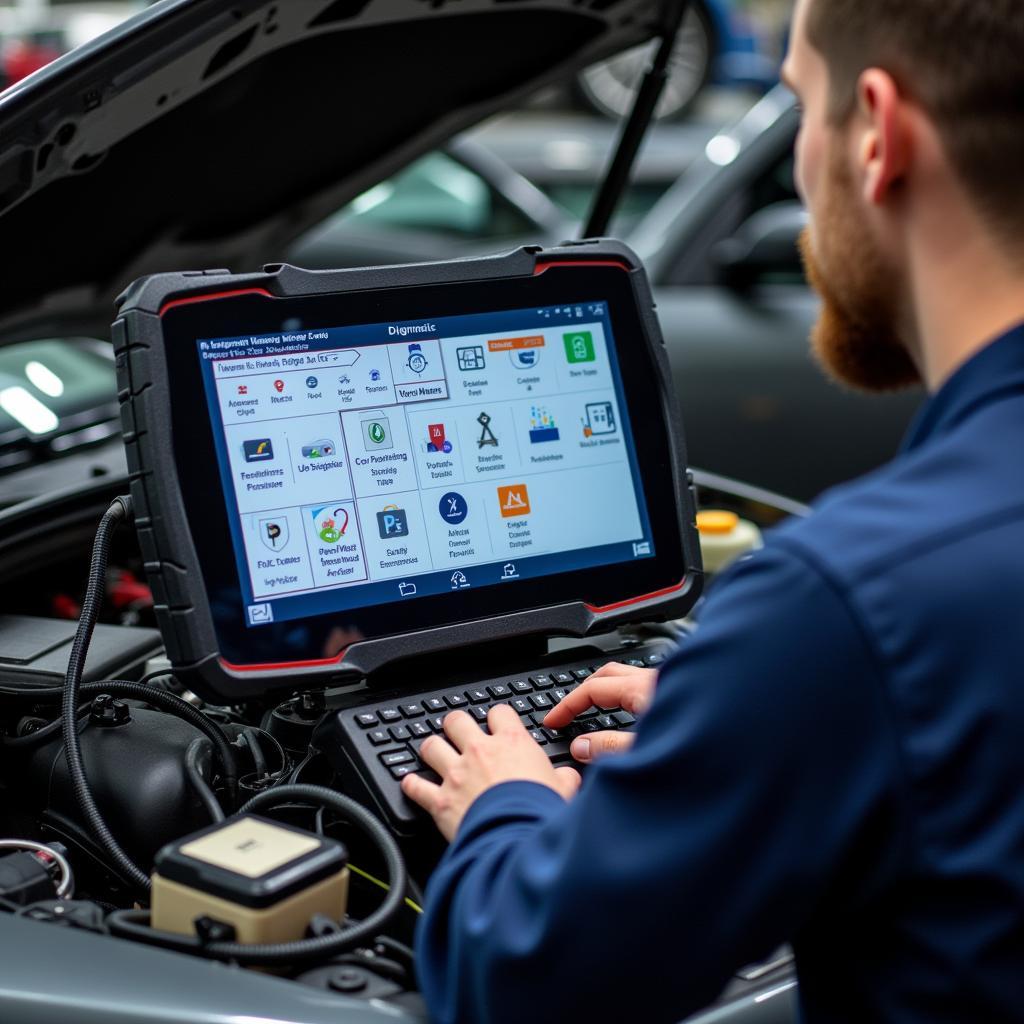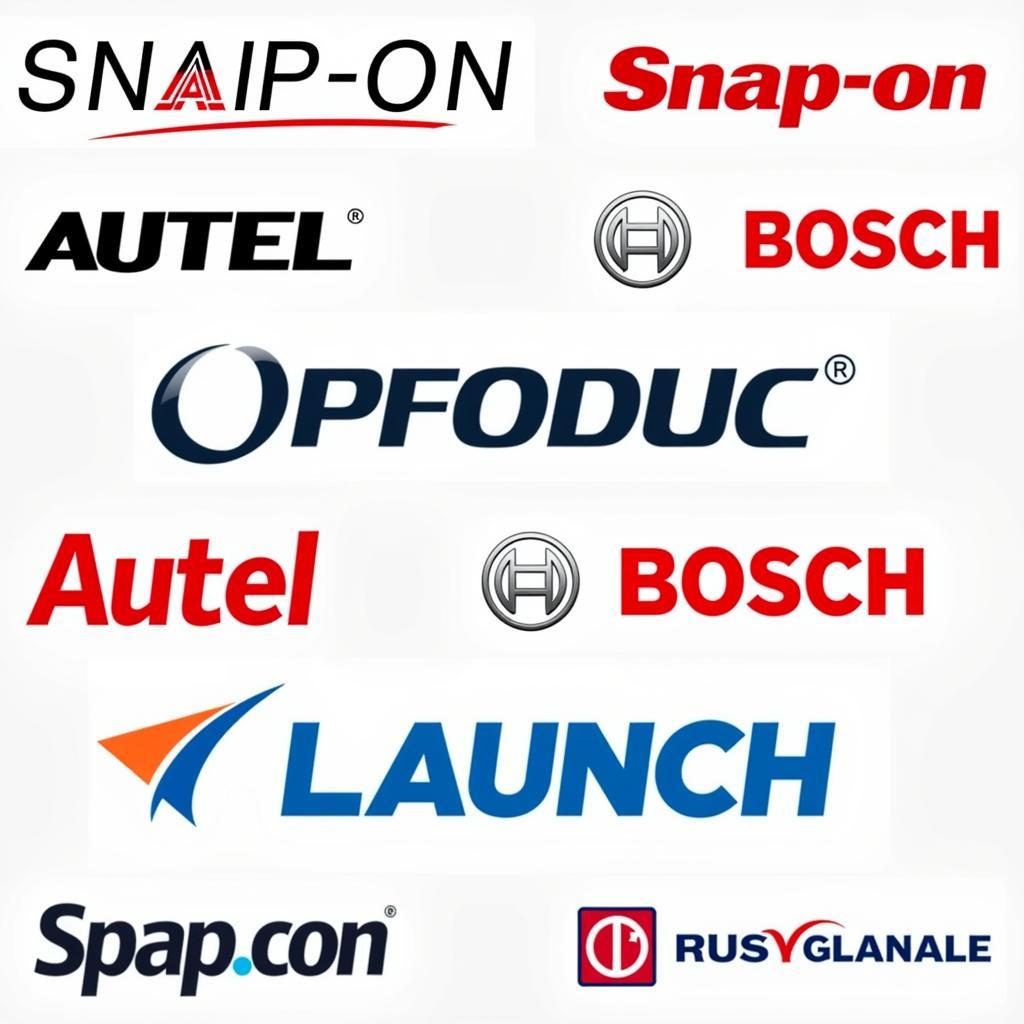Understanding the cost of a car diagnostic machine is crucial for both car enthusiasts and professional mechanics. Whether you’re a DIYer looking to troubleshoot your own vehicle or a garage owner wanting to invest in the best equipment, this guide will break down the factors influencing car diagnostic machine prices and help you make an informed decision.
Factors Affecting Car Diagnostic Machine Prices
Several factors contribute to the wide range of prices you’ll encounter when researching car diagnostic machines.
1. Functionality and Features
The old adage, “you get what you pay for,” rings true in the world of car diagnostic tools. Entry-level OBD2 scanners, offering basic code reading capabilities, can be purchased for as little as $20. However, professional-grade machines, equipped to handle complex diagnostics, programming, and advanced coding, can cost upwards of $10,000.
 Professional Car Diagnostic Machine in Use
Professional Car Diagnostic Machine in Use
Consider your specific needs and the level of detail you require from the diagnostics. If you primarily work on a single car make, a less expensive model tailored to that brand might suffice. However, for multi-make diagnostics or specialized tasks like ECU programming, a more advanced and expensive machine is necessary.
2. Software and Updates
Software is the backbone of any car diagnostic machine. Basic code readers come with pre-loaded software, while advanced scanners often operate on subscription-based platforms. These subscriptions grant access to regular updates, ensuring compatibility with the latest vehicle models and providing access to repair information and technical support.
Factoring in the cost of software updates is essential, especially for professional use. While some manufacturers offer lifetime free updates, others charge annual fees, which can range from a few hundred to several thousand dollars, depending on the level of coverage and features included.
3. Brand Reputation and Quality
Established brands in the car diagnostic tool industry, such as Snap-On, Bosch, Autel, and Launch, often command higher prices due to their reputation for quality, reliability, and after-sales service.
 Leading Car Diagnostic Machine Brands
Leading Car Diagnostic Machine Brands
While opting for a lesser-known brand might seem tempting to save money, carefully consider their track record. Research customer reviews and compare warranty offerings to ensure you’re investing in a reliable tool that will stand the test of time.
Types of Car Diagnostic Machines and Their Costs
Car diagnostic machines come in various forms, each catering to different needs and budgets.
1. Basic OBD2 Scanners ( $20 – $100)
These entry-level scanners connect to your vehicle’s OBD2 port and retrieve basic diagnostic trouble codes (DTCs). They’re ideal for DIYers looking to identify simple engine-related issues.
Check out our recommended OBD2 scanners for DIY car maintenance.
2. Handheld Scanners with Advanced Features ($100 – $1,000)
These portable scanners offer a wider range of functions, including live data streaming, component activation, and some coding capabilities. They strike a balance between affordability and functionality, making them suitable for both enthusiasts and smaller workshops.
3. Professional-Grade Diagnostic Platforms ($1,000 – $10,000+)
These high-end systems offer comprehensive diagnostic capabilities, covering all vehicle systems, advanced programming functions, and access to extensive repair databases. They are indispensable for professional mechanics and specialized workshops dealing with complex repairs and diagnostics.
Learn more about the advanced features offered by professional car diagnostic platforms.
Cost of Ownership: Beyond the Initial Purchase
Beyond the initial purchase price, consider these ongoing costs:
- Software Updates: As mentioned earlier, these can be subscription-based or one-time purchases.
- Training and Support: Mastering advanced diagnostic tools often requires specialized training, which can incur additional costs.
- Accessories and Adapters: Specific vehicle models or diagnostic procedures might require additional cables, adapters, or software licenses.
Finding the Right Car Diagnostic Machine for Your Needs
Choosing the right car diagnostic machine requires careful consideration of your budget, needs, and technical expertise.
Ask yourself these questions:
- What types of vehicles will you be working on?
- What level of diagnostic detail do you require?
- Do you need advanced features like programming and coding?
- What is your budget for both the initial purchase and ongoing costs?
Conclusion: Investing in Automotive Intelligence
A car diagnostic machine is an investment in automotive intelligence, empowering you to understand and address your vehicle’s needs efficiently. By carefully considering the factors outlined in this guide, you can make an informed decision and choose a machine that aligns with your budget, skills, and diagnostic requirements.
FAQs
1. Can I use any diagnostic machine on any car?
While OBD2 scanners work on most cars manufactured after 1996, some vehicles require specialized software or adapters for full system diagnostics.
2. Do I need a professional-grade machine for DIY car maintenance?
Not necessarily. A basic OBD2 scanner or a handheld scanner with advanced features can suffice for most DIY tasks.
3. How often do car diagnostic machines require software updates?
This varies depending on the manufacturer. Some offer updates several times a year, while others provide them less frequently.
4. What are the benefits of choosing a reputable brand?
Reputable brands often offer better quality, reliability, longer warranties, and superior customer support.
5. Can I get financing options for purchasing a car diagnostic machine?
Yes, many manufacturers and retailers offer financing options, especially for professional-grade systems.
Still Have Questions?
Need help choosing the right car diagnostic machine for your needs? Contact our team of experts through WhatsApp: +1(641)206-8880 or Email: [email protected]. We’re available 24/7 to assist you.

Leave a Reply